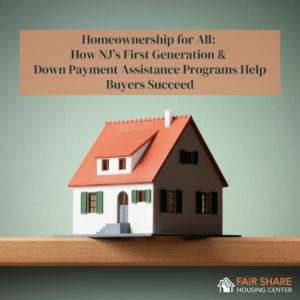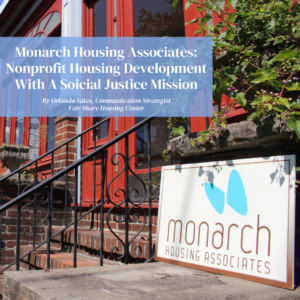ARP Funds Provide a Unique Opportunity for NJ to Make a Historic Investment in Affordable Housing
February 24th, 2022
Now is the time to think big about addressing New Jersey’s affordability crisis. ARP funding provides a potentially once in a lifetime opportunity to be strategic about how we leverage federal and state dollars to create meaningful
and transformational change to address housing inequities and affordability in our state. New Jersey should follow the lead of states like California and New York, who have committed to making historic investments in housing, and use ARP dollars to purposefully address systemic racism, segregated housing markets, and historic disinvestment in communities of color. A comparable investment in New Jersey would be between $5 and $11 billion. Major investments in (1) the production of new affordable homes, (2) the preservation and repair of existing affordable homes, (3) and closing the racial wealth gap through a first-generation homeownership program will make New Jersey a more affordable state for individuals and families.
New Jersey is digging out of a deep shortage of affordable homes. Coupled with recovery from the COVID-19 pandemic and rapid population growth in certain parts of our state, the time is now for a major investment in affordable housing.
The non-enforcement of the Mount Laurel Doctrine between 2000 and 2015 resulted in the underproduction of more than 300,000 homes, all while rent and home prices grew significantly. This underproduction only exacerbated New Jersey’s deep racial disparities, among the worst of any state in the country across multiple indicators of well-being, including disparities in access to housing and home ownership for communities of color.
Even though New Jersey is now moving forward with building more affordable homes, it’s still not keeping up with the need. As demand for housing in New Jersey rises, both the for sale and rental markets continue to climb. Without significant and purposeful investment in creating and preserving affordability, this growing demand for homes risks becoming an engine to further price out many lower-income families, especially families of color. More resources must be invested to safeguard affordability for residents in our state, and ARP funding provides a unique opportunity to do so.
Recommendations:
1. Build more affordable housing, especially in areas where rising markets are pushing out communities of color.
Over 340 towns have reached settlements to implement their fair housing obligations. And many of New Jersey’s gentrifying cities have implemented new policies to increase affordable housing production. Many of these strategies rely in part on public funding, which has not kept pace with the need. Nearly 50 100% affordable developments with approximately 3,500 affordable homes are currently waiting for Low Income Housing Tax Credit (LIHTC) funding – including homes for families, seniors, and supportive housing for people experiencing homelessness and people with disabilities. And ARP funds can and should support innovative solutions to tackle housing instability and homelessness, such as converting old motels into supportive housing units. A $300 million investment, for example, leveraged with other available funds, would produce 1,500 to 2,400 new affordable homes.
2. Preserve and maintain existing affordable housing units in New Jersey with a focus on those most at risk at being lost to market rate units and to climate change.
Thousands of New Jersey’s existing public and subsidized homes are in desperate need of maintenance and repair. Without investment in these homes, residents are at risk of homelessness. Thousands of units in public housing developments and assisted housing units have REAC Physical Inspection scores indicating they require immediate reinvestment, significant rehabilitation and/or replacement altogether, with a disproportionate number in cities such as Newark and Hoboken. Many of these homes are also located in neighborhoods at risk from climate change and need not just maintenance but also resiliency investments. We estimate that New Jersey would need to invest more than $2.2 billion to address all the renovation needs in both public and assisted housing in New Jersey. These funds should be dedicated to those units most at risk of being lost—those in gentrifying neighborhoods and homes historically built under Mount Laurel—which are significant targets
Dedicating resources to this type of preservation is critical to meet the housing needs of our state and to keep access affordable.
3. Create and invest in a first-generation homeownership program.
Homeownership is the primary way that individuals and families build wealth. In New Jersey, significant disparities in homeownership rates between white people and Black and Latino/a people have largely contributed to the monumental racial wealth gap in our state. Even though New Jersey already has a first-time homebuyer program, targeting the scope of the next phase of the program to first-generation homebuyers will more acutely address racial disparities in homeownership. The program should also target gentrifying areas to ensure that residents have the ability to own a home in their current communities, and also benefit from the equity that is gained by housing appreciation in those areas. Funding could also be used to support alternative forms of homeownership like land trusts and section 8 homeownership programs being run by cities such as Newark, and to help owners move into units created through the Mount Laurel process that provide opportunities that otherwise would not be available. We recommend at least a $75 million investment for an initial program.






